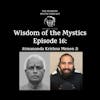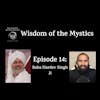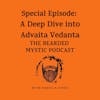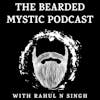Wisdom of the Mystics: Rumi
In this episode, The Bearded Mystic Podcast discusses the wisdom of one of my favorite poets Rumi. He was a 13th-century Persian poet, that has transcended geography, time, and ethnic divisions. He is known as the most popular poet because he often has quotes attributed to him that are shared on every social media platform!
In this episode, I go through the mystical poetry of Rumi that mainly focuses on what religion really is and the oneness of Truth, beyond traditions and institutions.
I hope you enjoyed listening to the Wisdom of the Mystics series and if you are interested in listening to more episodes about Non-Duality and a deep-dive into the Bhagavad Gita , please follow/subscribe to this Podcast.
Please rate and write a review for this Podcast on https://www.thebeardedmysticpodcast.com/reviews/new/ it will be greatly appreciated.
New episodes will be available every Sunday.
If you would like to attend a free weekly meditation with me, join my Whatsapp group:
https://chat.whatsapp.com/DcdnuDMeRnW53E0seVp28b
Subscribe to the free monthly The Bearded Mystic Newsletter: http://thebeardedmysticpodcast.substack.com
Subscribe to The Bearded Mystic Podcast Community
https://www.patreon.com/thebeardedmysticpodcast
You can find links to Live Streams, Podcast, Videos etc: https://linktr.ee/thebeardedmysticpodcast
You can follow me and contact me on social media:
Website: https://www.thebeardedmysticpodcast.com/
TikTok: https://vm.tiktok.com/ZMdk3HPJh/
Discord: https://discord.gg/4DbureZw8y
Instagram: https://www.instagram.com/thebeardedmysticpodcast/
Youtube: https://www.youtube.com/c/TheBeardedMysticPodcast/
Twitter: https://twitter.com/bearded_mystic
Facebook: https://www.facebook.com/The-Bearded-Mystic-Podcast
Can all the strange, weird, sometimes inexplicable happenings in our life be real? ...
Listen on: Apple Podcasts Spotify
Support the showHello and welcome to the Bearded in Mystic podcast. And I'm your host, Rahul and Singh. Thank you for taking out the time today to either watch or listen this podcast episode. Today we will be continuing on with our special series on the Wisdom of the Mystics and today we will be looking at the Persian Mystic Rumi. Last month we looked at Kabir Ji and his poetry. Today we are going to be looking at the poetry that Rumi has given and has inspired so many across the world. In fact, from what I believe he is the most well known poet in the world. Thanks to the English translations of his poetry. Before we get started, if you would like to support The Bearded Mystic Podcast and you love what you've been learning here, and you've enjoyed what you've been listening or watching on the YouTube channel or on this podcast, then please do support this podcast by signing up to our Patreon page. Now there's different tiers that you can choose, choose whatever tier you want, and just know that I appreciate the support that you give. If you have been enjoying the teachings that we share on this podcast, you may want to put this in your practical life, or you may just want to meditate along with me and you can do that every Saturday. There's a free virtual zoom meditation class that happens at
11:00 AM Eastern standard time. You can find all those details in the video description and show notes below. Now we are gonna go right into this and we are gonna look at the first poem by Rumi. And it's called why fear death? Starting life as a grain of dust, I died and passed into the life of moving things, which in turn became creatures of the tide, and crawled to earth and to the air with wings, then these creatures gave way to humankind, death is the stepping stone to higher states, so one day I shall die and I hope, I find myself admitted through heavenly gates, where angels dwell and in time also die, and thus transformed, I'll shed angelic shape and become that, which neither brain nor eye can imagine or see, this last escape to non-being, where forms do not exist, united with His single cosmic mist. Very beautiful poem. What we will do is dissect it, line by line or by two lines, and we'll look into what they mean. What a beautiful poem in general, and really it does answer the question of why fear death? And puts into perspective on how we can relate to this question, which I find to be really appealing. It begins with starting life as a grain of dust. Now, I would even take this a notch higher and say, this is talking about understanding that we are just made up of atoms or you could say we are all part of the Stardust, the sneeze of the big bang. So in a way it's very true. It started life as a grain of dust. It dies from that and then passes on to the life of moving things, which in turn becomes creatures of the tide of the water. And we know this to be true from evolution that life began in water and then went on to land. And this is exactly what Rumi says here, and then says, and crawl to earth and to the air, with wings. Then these creatures gave way to humankind, showing again, that realistically we move forward into higher states. We move closer to what we need to be. What's interesting here is it's very similar one to evolution, but also to reincarnation. Why I say reincarnation is because that seems to be the most plausible answer for me when it comes to whether life has been continuous or not. It makes sense for there to be a continuation of life, even on the form of the physical, of the material. So that to me makes sense. As he says beautifully, death is the stepping stone to higher states. Now that means that there's a journey that continues on even after death, even though we won't be able to consciously locate it within this body and mind anymore because the body has passed on, it's stopped functioning, the life breath has disappeared. The prana is no longer there. It's very much aligned to reincarnation here. Death is just a stepping stone to understanding that we are not this body and mind. Therefore, we cannot associate or identify that this is always what we are going to be. That's all, nothing more than that. And then he says, so one day I shall die and hope I find myself admitted\ through heavenly gates. So just remember that Rumi is talking about a progression here. He's talking about a stepping stone to higher states and associates heaven as a higher state. But again, he says in the next line where angels dwell and in time also die. So we know that that time isn't eternal either in heaven or it's a permanent place to be, that there is something more than that. And again, I don't know if this fully aligns with his religion, which was Islam but all I can do is go by the poetry he's given and trust the translator on this. He says something very important that where angels dwell and in time also die and this is very interesting in terms of comparing it to Vedanta because we say the Devis and Devtas eventually want to come back on to the earth to be liberated or to attain mukti. So it is really interesting how this is mentioned here that in time also die and thus transform, I'll shed angelic shape. So seeing angelic shape as a subtle form, and that's a really interesting line to think about. And become that, which neither brain nor eye can imagine or see. Now, what could that be? If we think about it, what the brain cannot imagine or see or what the eyes cannot see. One, we cannot see consciousness, but we can experience consciousness. We can experience things that inhabit consciousness but we cannot see consciousness directly. We know that consciousness is Formless. We constantly talk about it on our podcast, that it is Formless Awareness. And here Rumi's talking about becoming that one Formless Awareness. That's literally what he's talking about, because what else is it when we shed all gross and subtle forms? But Brahman, but this ultimate reality. Then he says this last escape to non being, this last escape to non being, therefore establishing even further that there is no form, no image and no sense of being. Where forms do not exist. United with his single cosmic mist. Now, the way I think about this is like the example that we give in Vedanta, of the projector, projecting images onto the screen. Now, the images that are presented onto the screen, do not affect the screen at all. The screen does not die or cry or laugh on whatever happens on the screen, what images appear on the screen has no effect upon it. I see consciousness like that mist, that this awareness is like a mist, that's always there, it's very thin, it's very subtle, subtler than the subtlest. But it's not affected by what's happening and that is a reason why we should not fear death, because we know that there is eternity here. In fact, no time and no space is in this. Hence, we can feel that eternity and because we've progressed to higher states, that does not mean that we end up being arrogant or we start saying that other people aren't good enough because they haven't got there. No, we have the humility, the understanding, the compassion that we understand where they're at, we understand that they need to progress. We get it. Some people are ready and some people are not, and that's simply how it is. And we don't get disturbed by that. But if anyone puts their hand out for help, we make sure that we do grab that hand and we bring them to a place of helpfulness, of understanding, of being compassionate and that is a non-dual way. What Rumi has talked about is the non-dual approach to death actually. When we become fearless, when we stop fearing what will happen after death, what will happen when we die? In fact, it's the biggest form of anxiety that we have. The one thing that I will stress upon is that when we have this fear of death, we cannot move forward in our spirituality. But when we address this fear of death, when we look at it and we analyze it and we see whether this fear is justified, then we can transcend. Then we ask the question why fear death because we know there is something more, we no longer feel anxious about that day. We no longer have that deep heaviness that is associated with death or with our passing by. Isn't it important that we live a life that is so fulfilling, so magnificent that if death did come knocking on the door and saying, you know, it's your time! That even death will hesitate about taking you because death will be like, I'm taking something beautiful from this earth. Wouldn't that be a beautiful thing? That in fact, death will invite you to die rather than take you in death. Wouldn't that be amazing? And that's what happens when we truly become fearless about death. When we truly embrace our mortality, our finiteness of the body and the mind because we understand that we are that consciousness, that Brahman, that is deathless, that has no beginning, that has no end. That is always here and always going to be. In fact, in the previous incarnations, it has always been. We just haven't been attuned to it, but it's been there. Formless, Imageless, Changeless, Shapeless, Boundless, and we get there when we first understand the finiteness of existence and that opens the door to the Infinite Nature of Existence, the Infinite nature of Formless Awareness. And then when we start identifying with this Infinite Formless Awareness, we start living a more fruitful, finite life. Therefore, death is merely an invitation than an elimination. Rumi's bringing out the poet in me. So that's the first poem. The second poem is truth and falsity. Let us not say that any doctrine lies, the scent of truth ensnares the minds of men. A gem of truth from every doctrine cries out to be heard, from every untruths den. Truth is the light of dark within the night, testing its power to shine through the dark, the discernment in all that's wrong of right, challenging truths from untruths to embark, in ragged crowds, the fakir goes unseen. His rags are the dress of humility, learn to discern the pure from the unclean, the spiritual prince from earthly royalty. The traders of this world trade merchandise, buying the good and rejecting the bad. If these were both the same, the enterprise of any distinction could not be had. Between right and wrong there's no equality. The sandalwood tree stands out from the Yew. Only a fool says there's no falsity, only a scoundrel says nothing is true. Let's dissect this. Let us not say that any doctrine lies. Very true. There's always an element of truth to everything. There's an element of truth because the esoteric teachings are all the same, which is to know oneself and oneself to be that which we call God or Formless Awareness. The scent of truth ensnares, the minds of mind. No matter what, there's a fragrance of truth. What is that fragrance of truth? That background Formless Awareness that we talk about. Rumi is very right. That fragrance is still there. No matter what we've gone through throughout all our lives, that awareness has been there watching everything and has not disturbed us at all. But when we start understanding that there is this fragrance there, then we start becoming more aware and alert of it and we start living more in this awareness, in this Formless Awareness. And that is the truth. When it says minds are men, minds of humans. I think men is mainly for the poetry rather than an actual meaning of the word. A gem of truth from every doctrine cries out to be heard from every untruth den. Now, when you think about it, institutional religion, they all now have untruth in terms of, you have to believe in a doctrine, you have to believe in its creed, you have to follow what it says. You have to believe that it is the only way and if you don't follow it, you should be guilty. Institutional religion, that is the untruth den, but a gem of truth from every doctrine cries out to be heard. That truth is this Formless Awareness, the realization of who we are, of what we are. And that is what is talked about here. That is what Rumi is referring to. Truth is the light of dark within the night, testing its power to shine through the dark. So no matter what, this truth is always full of light, we have to utilize this truth. We have to utilize it so much that it literally rips through the darkness and that's what we've got to do. Constantly see the truth in everything we do and then we understand that it's everywhere and it says testing its power. That means that we don't just merely believe that it's the truth. We test it. We see how it compares to the darkness of ignorance. We test it completely. We test it against duality. This non-dual light. Yeah. This non-dual awareness. And we constantly play this game of challenging the darkness, understanding that even the darkness is within the light. Then he carries on to say the discernment in all that's wrong, of right. Challenging truths from untruths to embark. To begin this journey, we have to challenge the truth from untruths. We have to take out the truths from what seems false. We have to discern what's right and what's wrong. We have to see what is changeless within the changing words of doctrine. We have to see the awareness, that's hidden behind these mystical words that are presented in these books. And that is the journey. Then it carries on to say that in ragged crowds, the fakir goes unseen because who wants to see someone that's dressed in shabby clothes, in ripped clothes, in unfashionable clothes. See if we saw someone spiritual wearing Gucci or Prada, we would probably be like, oh, that's amazing. And we'll find more credibility in that person's spirituality, when it could be just pseudo, it could be just on the surface, but someone who is humble, that doesn't care about the external, but cares more about the internal, that person is a person of truth and only a few see these people. Only a few. Many people may follow a religion, follow a spiritual Guru, read all the spiritual texts, but only a few recognize that Fakir, that person, who can show you the truth instantaneously, who can show you the truth of what you are. To recognize such a person is to go beyond the flowery words that they say, but to go to the heart of the matter, are they practicing what they're talking about? Are they honest with you? Do they have their integrity? That's the question. His rags are the dress of humility. Now what we can also take from this is the metaphor because Rumi's Guru, Shams was very direct, very harsh. Not everyone could swallow his message. Not everybody could take it. What may be seen as rags, as unrefined and we might find that its not appropriate, but actually it's humility. Maybe this person will say to you that you are absolutely blind and you cannot see the truth and you may get offended, but inside they are seeing the same truth resonating in you. And they're saying you can't see this truth that I can see, but because we get offended by the words, we think, oh, this person's crazy. I'm moving on. They're arrogant. I'm moving on. So it's very important that we first look at the person. See what they're saying? Look beyond the words a little, read between the lines. That's more important. Then he says, learn to discern the pure from the unclean, the spiritual prince from earthly royalty. Anyone can look great. Anyone can look Royal, but the real royalty is the mind and how calm it is. How the diamond of truth is shining forth from that person's mind. From their eyes, you can see gems of truth. From the mouth are words spoken that are pearls, rubies and emeralds. And that's the thing, the spiritual prince is that person, any person, man, or woman, or it that sees themselves and understands themselves and you to be that one eternal truth, that one eternal Formless Awareness. So learn to discern the pure from the unclean. That's what it means, the Formless from the forms, the Formless is hidden within each form, but not every form recognizes their formlessness and that's the key. The traders of this world, trade merchandise, buying the good and rejecting the bad. We all just look for things that give benefit to us, rather than going through certain experiences that may not be beneficial. Sometimes failure is important. Sometimes going through pain is important. Going through conflict is important. Sometimes integrating our spirituality is not so easy and we find that our ego puts up a massive fight. So we don't reject the ego. We in fact embrace what the ego wants to present and then put it through the discernment through the knowledge, through the fire of knowledge, through the fire of Brahman and that's what we do. We burn away all that conflict. So we don't just buy the good and reject the bad, we see the value in both. But the people of the world, they only want to go for pleasant experiences. They only want to go for that dopamine hit, but what they don't understand is that dopamine hit is gonna have a negative response. For example, this is something everyone can relate to who has drunk alcohol. Being drunk is amazing, but the next day, when you get a hangover, it's not so amazing. Or sometimes when we are watching a movie that we've enjoyed and we are awake till four o'clock in the morning, but then we have to wake up for work at seven. We only have three hours sleep, even though we enjoyed the movie. When we wake up in the morning, we are feeling groggy and tired. We can't reject that tiredness. We can't reject that grogginess. We have to feel it. We have to experience it. If these were both the same, the enterprise of any distinction. So the business of any distinction, of discernment could not be had. So they're different for a reason, cuz they both have lessons to show you and different lessons to improve your human existence. To the Formless Awareness, it doesn't really matter. Good or bad. It's beyond that. But for the mind, in its human existence, it has to discern both therefore the business or the enterprise of distinction is necessary. But if these two were the same, the good and the bad, then we won't be able to discern. There'll be no need to discern then. So the understanding here is there is going to be a relative existence. This is where I'm different to the pseudo non-dualist because they believe there's only the ultimate level, but a traditional Advaitin or a traditional non-dualist will understand that within the ultimate level of reality, there is the transactional, because right now we are the transactional. We are the relative level and we are living in that state. So this is what's being mentioned here. Then Rumi says between right and wrong, there's no equality. What's right is right. And what's wrong is wrong. They're both different. There's no need to see them as equal things. And in fact, the equal thing is beyond both of these, the right and wrong, being in the state of being neutral. The sandalwood tree stands out from the Yew. Now a Yew is a type of tree and obviously the sandalwood is different because the sandalwood has a beautiful fragrance. In fact, some of us, I use it as an incense stick. I put that on and it gives a fragrance of sandalwood and I enjoy that. Then the next two lines are very important. Only a fool says there's no falsity. Only a scoundrel says nothing is true. And this is very true. Think about it. That would be foolish to say that there's no such thing as the false, even if it is an appearance means that there is an element of truth to it. Even if it's an appearance. Then it says only a scoundrel says nothing is true. Sometimes people give up on the spiritual search. They don't wanna go further in the seeking. They're given up. So they say, well, nothing is true and they stop. And that's not great either. So we are not meant to give up and we're not meant to say, well, there's no such thing as the false. We have to embrace that there is the false on the relative level. On the ultimate level, there's only what is true. This poem very beautiful. It explains what's true and false and how we can recognize it. And what's the purpose for both of them in this relative level of existence, but in a non-dual state with the Formless Awareness in the background. Next one is all religions are true. When the righteous, regardless of faith, invoke the prophets who direct the soul to Him, they're like wine from several cups, poured to mingle and fill a single bowl. Their praises are directed to the One, so all prayers and religions are the same directed ultimately to One Light, of Him, regardless of the earthly name, that one or other religion may use to praise the One though, some in error fall into mistaking the radiance of Light, from the moon, reflected on the blank wall for the light, from the radiant moon itself, or seeing its reflection in a well, they mistake it's image for the real thing and worship it. Only the moon can tell if this worship, being for a reflection, is idolatory leading prayers astray - are all images condemned as idols forbidden to the worshipful who pray. Very interesting poem, I guess the aspect of idol worship could be mentioned here, or when we say idol worship, don't just think of this in terms of the Hindu devis and devtas, but I would say anything we utilize, any object, physical object that we use to direct our worship is to be mentioned here. So as much as people like to say idols is only in statues. I would say it's also in a building. It's also in a book, it's in any object, even in the sound of a mantra, it is there. In the sound of a prayer, in my opinion is considered to be an idol because you're idolizing something. When the righteous, regardless of faith, invoke the prophets who direct a soul to him, they are like wind from several cups, pour to mingle and fill a single bowl. It doesn't matter where you get the truth from, it doesn't really matter. What really matters is that you get the truth. Now when you invoke the prophets, meaning invoke the beings within that reside. Everyone has the Buddha, Lord Krishna, Ashtavakra, Rumi, Hafiz, Kabir, Guru Nanak ji, so many, every Sage that you can think of is within here. And when you remember their teachings, they are like wine from several cups. Pour to mingle and fill a single bowl. So when you drink them, when you drink their teachings, when you absorb their teachings, you go into that Formless Awareness because that's what they all go back to. Their praises are directed to the One, there's only one Formless Awareness. There's not two. Every religion says there is only One. Yeah, it may have many names, but it's one. Even with names, we give them many, even for that One. We give attributes to Its name or as Its name. All praises are directed to the One. All prayers and religions are the same. Directed ultimately to One light of Him, regardless of the earthly name. Doesn't matter what name we give. Ultimately, it's this one truth. It's this one reality. This Formless Awareness. It's directed at That. Regardless of the earthly name, that one or other religion may use to praise the one. Doesn't matter what someone uses. We don't get offended. Just because someone uses the word or name Allah or Brahman or God, or WaheGuru or Jehovah or Rab or Paramatma. Doesn't matter what name is used. We all know that it's directed to that One, to praise that One. Anyone that has understood the truth can say this, anyone that's had that esoteric realization understands this. That's why anyone that is totally identified to the name of their religion, any religion, in my opinion, does not understand much about the Truth. Yes. They understand the identity of that religion. They understand the culture of that religion and for that they are great at. But to understand the Truth is another thing and that Truth requires no religion. That truth is not dependent on any religion. It doesn't want a religion. It doesn't need a religion because the moment a religion tries to define it, they lose it. That's why Rumi refers to it as the One. Then he carries on to say, though some in error, fall into mistaking the radiance of Light from the moon reflected on the blank wall, for the Light from the radiant moon itself. So it's like that whole thing about the finger pointing to the moon. People keep looking at the finger, but they don't look at the moon. I remember when my teacher once said this and it really hit me. My teacher constantly told us to look at the Formless Awareness. Direct our attention to the Formless, constantly told us this. And all we did was praise our teacher. We fell in love with our teacher, bypassing the importance of His teaching. And when He said that line, it changed the way I viewed spirituality as a whole. That maybe I was associating too much to my Guru rather than to His teaching. And that's the same thing that Rumi is talking about here is that instead of looking at the moon, we look at the reflection of the moon and say, that's the moon. And all religious institutions are just the reflections of that Truth, all the names of what we term as God, or the ultimate are just reflections of that One. Another way he emphasizes this point, is that, or seeing his reflection in a well, they mistake it's image for the real thing and worship it. This is what we do, when we say that I belong to this religion. I belong to that religion. I am this, I am that. We're not looking at the Truth. We're going for the culture. Nothing wrong with the culture. Very important to have the culture, but the real thing is the Truth, the Light. So we should never mistake the religious institutions, the teachings, or the words, to be the direct Light itself, to be the Awareness itself. That occurs within our own Being. Sometimes we can become too fixated on the words that are said on the scripture, instead of looking at the Truth behind them. And if there is truth behind them, because not all things said in the scriptures are of this Formless Awareness or of this Truth. They may be written for that time and place. The things they say are right for that time and place, therefore it's up to us to discern the difference and that's why it's so important, that we have a strong foundation in our spirituality, because when we sharpen our intellect, we can discern between what is the truth and what is not the truth. Only the moon can tell if this worship being for a reflection, is idolatry leading prayers astray. Who are we to say that someone's path is untrue? We know the path is a reflection, but why should we say it's untrue? Why should we say it's idolatry? They're worshiping idols? I see so many comments on TikTok, against my videos and people who create content like I do and they call us idol worshipers or whatever, but don't throw a stone in a greenhouse because at the end of the day, you don't know what action you may be doing that can be considered the same thing that you're accusing another of. Only the moon can tell. When we are in that Formless Awareness, can we then say whether this reflection is worthy or not? But a person who has gone through the proper process of getting to the Formless Awareness will see the value of the reflection too. They will see its limitations and get someone to understand the limitless. That's what they do. A person who has truly realized. Then Rumi ends with this one question: Are all images condemned as idols forbidden to the worshipful who pray? Are all images, because even the name is an image. Even the word is an image. Even a sound is an image. Even a movement is an image. What's more important is if someone has that, as Rumi says, the worshipful who pray. They are full of worship, they're full of praise for the One. They're fully attuned to the One. They're one with the One. Isn't that more important? It's worth thinking about. Now we'll look at the last poem, which is called Eternal Light. We are wedded to eternity when our lives are done, there remains no mystery, we dissolve into The One. The rays of sunlight, scatter forming the shadows' shapes multiplicities of matter are gathered in a bunch of grapes. Death is but an illusion so surrender your mortal soul and subject it then to the fusion of the fragment with the whole. He exists beyond good and bad, no judgment can apply beyond all feeling, not happy nor sad beyond the realms of truth and lie. Fix your eyes on the eternal face with no idle talk of invisibility. Surrender to Him and He will place that in your eye, which you must see. And look! The bird of vision in flight alights upon your inner eye to shine with God's Eternal Light on wings of desire this bird does fly. Don't think there's much more, I wanna add to this because I've discussed this throughout the whole podcast. But a beautiful poem to end with because this explains what it's really like to be in the eternal light to be wedded to eternity, there is no death. There is no mystery because we just dissolve into this Formless Awareness, this Oneness. We see our mortality and as it says, we create a fusion of this fragment into the whole. We know that this is beyond good and bad. No judgment can apply here. Beyond all feeling, not happy, nor sad. This is a non-dual state of being, and this is what Rumi is explaining. And fix your eyes on the eternal face. That's all I'm gonna say. I'm gonna end it here. Fix your eyes on the eternal face. What is the eternal face? This Formless Awareness and with no idle talk of invisibility. Do not think that it's invisible. It's right there. You can see it with the inner vision. And anyone that knows what I'm talking about with this background, Formless Awareness, you understand exactly what I'm saying. And if you do make sure you like, comment and share this video. If you've enjoyed what you've listened to write a review, tell me what you liked about it. Let me know how you felt at the end of this podcast episode, because this is what's important. When we share with each other, our experience of that Divine and Rumi really brings that out of us. And in the poetry today that we've explored, he's emphasized this, and I hope that we've all absorbed this message, and I hope we've all become one with the Oneness. With that Formless Awareness. That is the end of the episode. If you would like to follow me on social media to keep getting updates or subscribe to the monthly, The Bearded Mystic newsletter, or join the Bearded Mystic Podcast Discord Server, the details are in the show notes and video description below. If you would like to support the Bearded Mystic Podcast, subscribe to my Patreon page so you can get extra content and to check other ways to support the link tree link will help you with that. Please do rate and review the podcast. I really will appreciate any reviews that you give, on how to do that. There's a link in the video description and show notes below. Thank you very much for listening. Aum Shanti Shanti Shanti. Aum Peace Peace Peace. Namaste.
New to The Bearded Mystic Podcast?
Here are some great episodes to start with. Or, check out episodes by topic.















